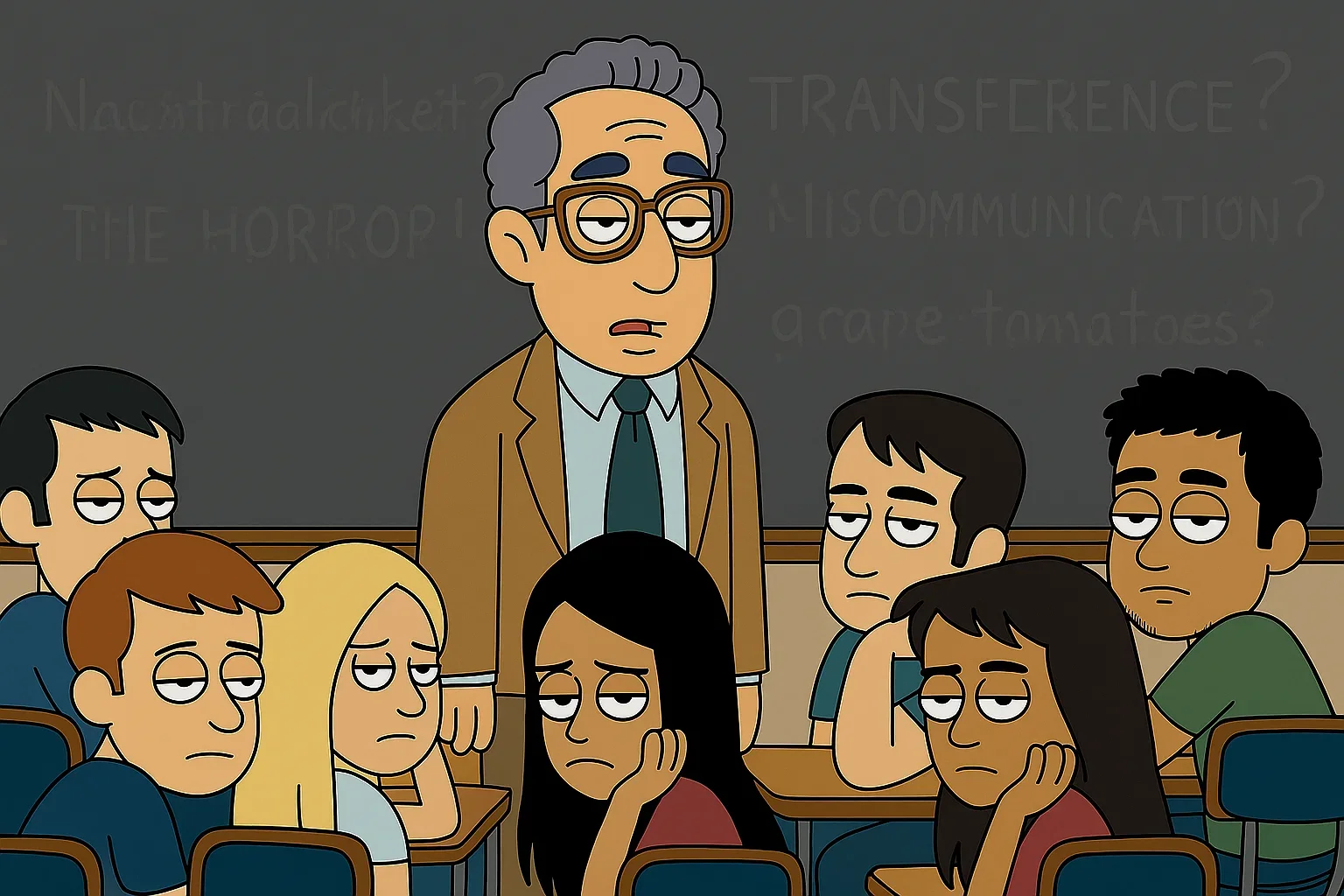The cashier scanned the tomatoes and placed the container upside down on the grimy conveyor belt. She had no idea it was inverted; the shape of the plastic container makes it look right-side up when it’s upside down. I had learned this the hard way myself, spilling an entire pint all over the kitchen floor.
I right-sided the container, bagged it, and offered my hard-won tomato wisdom, feeling helpful and hopeful. I even threw in a light complaint about the poor design, hoping to bond over a common enemy. The cashier paused for a beat, stared at me, and resumed scanning, acknowledging that she’d heard me and would not be joining the conversation. Silence followed.
Ready to exit a hero, I walked out in frustration and despair, ashamed to have tried. I had surely come off as condescending, and I felt demoralized. Joseph Conrad gives dramatic voice to this experience in Heart of Darkness:
“It is impossible to convey the life-sensation of any given epoch of one’s existence—that which makes its truth, its meaning—its subtle and penetrating essence. It is impossible. We live, as we dream—alone.”1
Bad feelings have a way of ballooning out of proportion, despite this being a comically minor tragedy in the grand scheme. And yet, can’t we transmit something, somehow? Even in circumstances like this, we must be able to communicate something of value to a stranger.
The problem with bad teachers, like me that day, is less the earnestness of intent and more the expectation of what teaching is and how it should go. The real lesson of teaching isn't about the subject matter or “learning something twice,” as the saying goes. It’s about the stakes and the dynamics of communicating something true.
The Fantasy of Transmission
We teach in order to be recognized as teachers. Teachers transmit knowledge, and the theory goes that the better the knowledge is packaged, the more frictionlessly the teacher can transmit it. Choose the right words, deliver them with care, and watch the lightbulb illuminate. This, we often say, is why we teach.
If only it were so easy. Aha moments, when they happen at all, tend to work retroactively, meaning they arrive well into the future in a narrative that begins with, “That’s when I realized…” Hindsight is 20/20, and as I wrote in a previous essay, most learning follows the logic of nachträglichkeit, Freud’s term for how meaning comes into being only after the fact.2
From a teacher’s perspective, this is maddening. You say the right thing at the right time, and it falls flat. If it does land eventually, nobody is hunting you down for congratulations. Further complicating things, every student brings their own world of projections to bear on the teacher, and these projections shape what they hear and how they hear it. Their absorption has more to do with their own psychology than whatever the teacher says, beautifully worded as it may be.
This is not the scenario we imagine when we sign up to teach, to coach, or to parent. We don’t picture blank stares and deferred comprehension. We want eurekas, not walls of negative transference. We want to play a leading role in someone’s transformation narrative, but we’re more likely just extras.
The Pain of Trying to Help
We offer up insights forged in personal experience, and often nobody cares. This undermines the apparent purpose of teaching, which feels more like ego-destroying work. If affirmation through epiphany is mostly imaginary, what’s the point?
To survive this existential concern, it’s important to question primary assumptions and consider how human communication actually works before setting any new benchmarks. Jacques Lacan elucidates a fundamental difficulty in communicating anything to anyone when he writes:
"The essence of language is not information, but misrecognition."3
Any communication, pedantic or otherwise, tends to backfire. Language is not a precision instrument, but a self-referential system of approximation. Even in the best-case scenario, we don’t fully understand what we ourselves mean. On the receiving end, we react emotionally to tone, and we mishear and interpret words in ways the speaker does not consciously intend.
Despite our best intentions, no one stands outside this failure. Everyone is caught in the same predicament—alone in our perspective, earnestly trying to share it clearly but never quite getting it across. Direct transmission of knowledge is a beautiful myth.
What the Teacher Learns
Lacan’s observation informs the quiet humility of the best teachers, who know they can’t simply hand over a truth they possess. At best, they can speak from it and trust that it might take hold in time, in ways they can’t predict or measure.
Teaching well means letting go of the fantasy of recognition. We must offer what we can and surrender to the process, trusting the truth will arrive when the time is right. This is the central pain of teaching: teachers are not in control of the outcome, and they probably won’t receive thanks for the learning they inspire.
When I was a distracted junior in high school, Mrs. Hudson assigned Heart of Darkness. My best effort wasn’t good enough, and I just couldn’t get through Conrad’s impenetrable prose and oblique narrative. Whatever she saw in the book I couldn’t find.
Thirty years later, upon rereading it, I heard Mrs. Hudson’s voice echoing through the fog of Conrad’s narration. She had been moved by its bleakness and enlivened by its dark perspective on the illusions of progress. Seventeen years after her death, she came back to me. A long lesson.
We offer our best words, hoping that someday they might find someone ready to receive them in their own voice, outside of our time, when they can finally make something of them. Bad teaching is seeking recognition; good teaching is speaking truthfully, and then simply waiting. Waiting for the perspective to shift. Waiting for the tomatoes to arrive right side up. Waiting, as Thomas Pynchon writes, “for the fog to burn off, and for something else this time, somehow, to be there instead.”4
—————————————————————————————————————————————
References:
Conrad, J. (1899/2007). Heart of Darkness (p. 33). New York, NY: Penguin.
Freud, S., Nachträglichkeit (various essays including From the History of an Infantile Neurosis, 1918, Vol. 17, p. 120), sometimes translated as “deferred action” or “afterwardness.” In J. Strachey (Ed. & Trans.), The Standard Edition of the Complete Psychological Works of Sigmund Freud (Vols. 1–24). London, England: Vintage.
Lacan, J. (1954–1955/1988). The Seminar of Jacques Lacan, Book II: The ego in Freud’s theory and in the technique of psychoanalysis, 1954–1955 (S. Tomaselli, Trans., p. 11). Cambridge, England: Cambridge University Press.
Pynchon, T. (2009). Inherent Vice (p. 369). New York, NY: Penguin Press.

